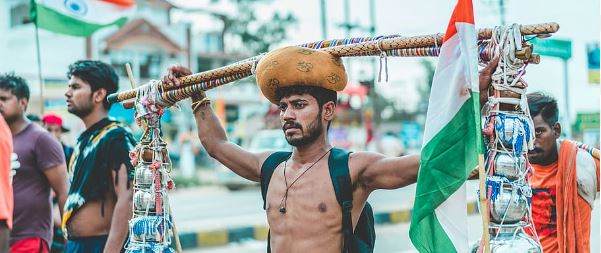Muzaffarnagar’s Communal Cauldron: A Melting Pot Turned Battleground
The historic city of Muzaffarnagar, once celebrated for its rich cultural tapestry and agricultural abundance, now finds itself ensnared in the vice-like grip of communal tensions. The annual Kanwar Yatra, a Hindu pilgrimage, has become a flashpoint, exacerbating existing fault lines and fueling a dangerous polarization within the community.
Historically a symbol of coexistence and cultural syncretism, the city’s vibrant past is being overshadowed by a rising tide of religious intolerance. The fertile Doab region, once a haven for diverse communities, is now witnessing a disturbing trend of communal strife, reminiscent of the dark chapters of its history marred by violence and bloodshed.
The Divisive Decree: A Chilling Reminder of Discrimination
A recent directive by local authorities, mandating the display of owners’ names and mobile numbers on eateries along the pilgrimage route, has sent shockwaves through the community. Ostensibly aimed at ensuring the “purity” of food consumed by pilgrims, this decree has been condemned as a discriminatory measure that targets the Muslim community.
This blatant attempt to segregate and marginalize a particular religious group has sparked widespread outrage, with even some members of the ruling Bharatiya Janata Party (BJP) expressing their disapproval. However, the dissenting voices have been drowned out by the deafening clamor of communal rhetoric, with the Chief Minister’s office doubling down on the directive, further alienating the Muslim community.
Political Polarization: A Recipe for Disaster
The timing of this controversy is particularly concerning, as it coincides with the aftermath of a national election that many had hoped would usher in an era of secularism and inclusivity. However, the resurgence of communal politics, with the state government actively promoting a Hindu nationalist agenda, has dashed those hopes.
The Kanwar Yatra, once a celebration of faith and devotion, has now become a platform for political posturing and the propagation of divisive ideologies. The pilgrimage route, once a symbol of unity, is now marred by suspicion and fear, as rumors of food contamination and religious impurity run rampant.
The Erosion of Shared Spaces and Cultural Fusion
The repercussions of this communal divide extend beyond the immediate context of the Kanwar Yatra. The very fabric of India’s pluralistic society, built upon centuries of cultural exchange and syncretism, is being threatened. Shared spaces are becoming increasingly contested, and the “other” is being pushed further into the margins.
The consequences of this polarization are dire. It not only undermines the fundamental principles of democracy and human rights but also jeopardizes the economic and social progress that India has achieved over the years. The demonization of minorities and the propagation of fear and hatred create an environment of instability and mistrust, which is detrimental to the nation’s well-being.
The Way Forward: A Call for Reason and Reconciliation
In the face of this escalating crisis, it is imperative for all stakeholders to engage in a constructive dialogue that transcends partisan politics and religious affiliations. The media has a crucial role to play in providing accurate and unbiased information, countering the spread of misinformation and hate speech.
Civil society organizations, religious leaders, and intellectuals must also step up and actively promote communal harmony and understanding. The government, both at the state and central levels, must uphold its constitutional mandate to protect the rights of all citizens, irrespective of their religious beliefs.
The path to reconciliation is long and arduous, but it is not insurmountable. By embracing dialogue, fostering mutual respect, and upholding the principles of secularism and pluralism, India can overcome this crisis and emerge as a stronger, more united nation.
Summary
The recent controversy surrounding the Kanwar Yatra in Muzaffarnagar has exposed the deep-rooted communal tensions that continue to plague Indian society. The discriminatory directive by local authorities, aimed at segregating the Muslim community, has sparked widespread outrage and fueled a dangerous polarization. The incident serves as a stark reminder of the challenges facing India in its quest for a secular and inclusive society. The path forward requires a concerted effort from all stakeholders to promote dialogue, understanding, and mutual respect, while upholding the fundamental principles of democracy and human rights.

Sunil Garnayak is an expert in Indian news with extensive knowledge of the nation’s political, social, and economic landscape and international relations. With years of experience in journalism, Sunil delivers in-depth analysis and accurate reporting that keeps readers informed about the latest developments in India. His commitment to factual accuracy and nuanced storytelling ensures that his articles provide valuable insights into the country’s most pressing issues.



